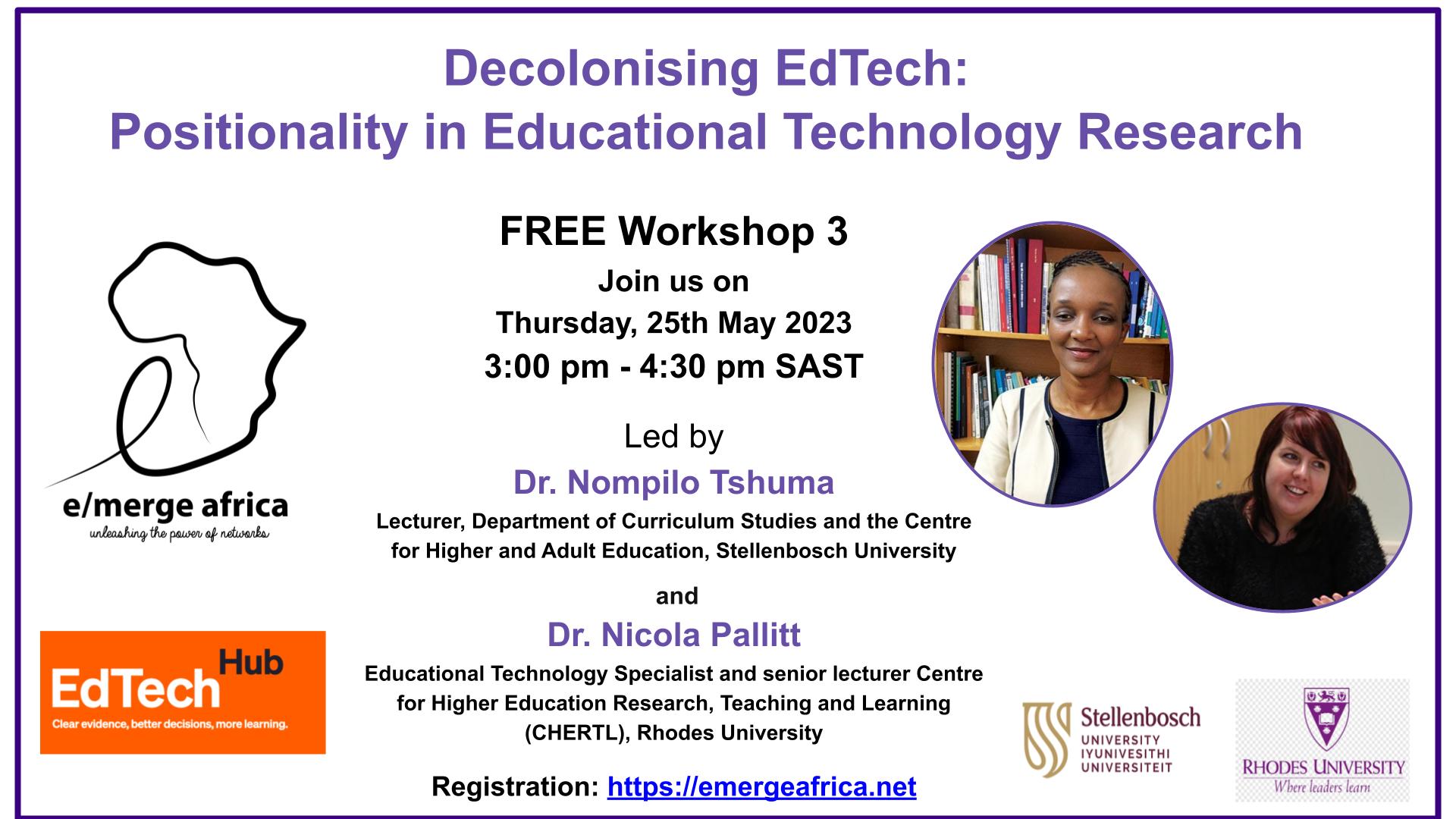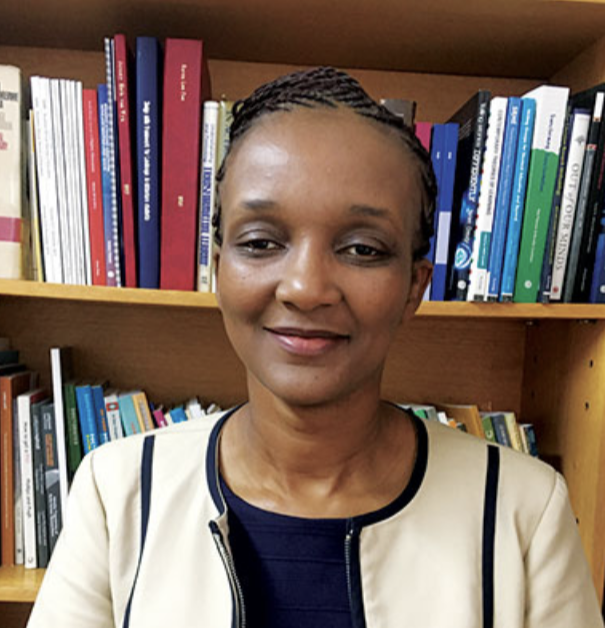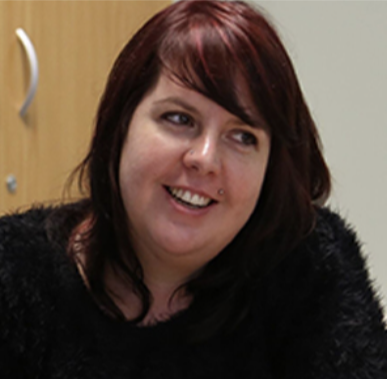
Join this session via Zoom here
Description of the session:
Have you ever thought about your own positionality and what it means for you as an educational technology researcher? Our positionalities shape our particular research interests, what we regard as worthy of studying, our relationships with our research participants, conceptual and theoretical lenses and the research approaches we are drawn to, and more. This interactive session will engage participants in a reflexive process where we unpack different kinds of positionalities together (social, intellectual, decolonial), the relationship between these and doing educational technology research.
Overview and context
In a context where Sub-Saharan African education systems, economic systems, governmental systems, academia, and the region itself continue to experience the legacies of colonisation, this workshop series seeks to create and support a sustainable and critical community of emerging researchers, research-practitioners and academics in Sub-Saharan Africa (SSA), with a focus on the field of Education Technology (Edtech) in order to:
address the colonial issues embedded in the field of Edtech and academic publishing systems and processes whereby epistemic orthodoxy systematically excludes non-Western epistemological, ontological, and methodological practices, and;
produce ground-breaking work that will catalyse distinctively African educational scholarship, voices, thoughts, experiences and agendas.
This will be a series of 3 workshops over a 3 months period from March to May 2023, covering critical educational technology conceptual frameworks, decolonising research methods, research tools, techniques, ethics and governance, and supporting SSA researchers towards publication.
Objectives of the writing workshops series
Goals involve:
To create and support a sustainable and critical community of emerging academics in Sub-Saharan Africa concerned with the topic of Decolonising Educational Technology.
Enable participants to submit high-quality papers to journals on educational technology such as – but not limited to – the UNESCO Chair Special Edition on Decolonising Education Technology.
Audience
The call for applications is open to emerging researchers or research practitioners from Sub-Saharan Africa, with a particular focus on education, education technologies, critical pedagogies, decolonising education, decolonising edtech, education and social justice, digital inclusion and digital rights in education, edtech and power. Participants from diverse backgrounds and minority groups are encouraged to apply. Attendance the two previous workshops not required
Join this session via Zoom here
Presenter’s Bio and Picture:

Nompilo is a Lecturer in the Department of Curriculum Studies and the Centre for Higher and Adult Education at Stellenbosch University. She has been working with educational technology since 2005 in both student and staff development, and as a researcher. Nompilo holds a PhD (Rhodes University) which focused on understanding the agency of academics as they integrate educational technology and quietly resist a range of constraining structural forces. Developing from this, her current research interests focus on reflexivity and critique by seeking a nuanced understanding of educational technology practices in higher education through a better understanding of context and the use of social theories.

Nicola is an Educational Technology Specialist at senior lecturer level in the Centre for Higher Education Research, Teaching and Learning (CHERTL) at Rhodes University. She provides learning design support and designs professional development opportunities for academics to use technologies effectively in their roles as educators. Nicola supervises postgraduate students and co-teaches formal courses in Higher Education. She received her PhD from the University of Cape Town. She values contextual and culturally responsive approaches to learning design and educational technology usage. She seeks to expand critical perspectives on educational technologies in Higher Education and regularly contributes to collaborative research.
Resources:
Tshuma, N. (2021). The vulnerable insider: Navigating power, positionality and being in educational technology research. Learning, Media & Technology, 46:2, 218- 229, DOI: 10.1080/17439884.2021.1867572 (pre-print available here)
What is critical in EdTech research? Daniela Gachago in conversation with Nicola Pallitt, Najma Agherdien, Laura Czerniewicz, Tutaleni Asino & Paul Prinsloo. Special Issue: Critique and Criticality in CriSTaL. Critical Studies in Teaching and Learning (CriSTaL), 11(SI): 119-126. DOI: 10.14426/cristal.v11iSI.651
Pallitt, N. & Kramm, N. 2022. ERT as mobile learning by necessity: A sociomaterial perspective of lecturers’ design journeys. International Journal of Mobile and Blended Learning (IJMBL), 14(3): 1-15.
About the partners/organisers
EdTech Hub is a global research partnership. Our goal is to empower people by giving them the evidence they need to make decisions about technology in education. We use an integrated approach that marries research, technical assistance and innovation to address the educational challenges faced by low- and middle-income countries around the world. We do this by collaborating with partners to provide governments with the resources to effectively integrate EdTech into their education systems. We work globally, and also on the ground in 7 focus countries: Bangladesh, Ghana, Kenya, Malawi, Pakistan, Sierra Leone and Tanzania. We are supported by the Foreign, Commonwealth and Development Office (FCDO), Bill and Melinda Gates Foundation, World Bank, and UNICEF. Learn more at www.edtechhub.org.
Emerge Africa
e/merge Africa is an educational technology network which is mostly for educational technology researchers and practitioners in African higher education. Since 2014 e/merge Africa has offered regular professional development activities in the form of online seminars and workshops and short courses.
